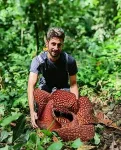UNDER EMBARGO UNTIL 00:01 BST WEDNESDAY 20 SEPTEMBER 2023 / 19:01 ET TUESDAY 19 SEPTEMBER 2023
New study finds that most Rafflesia species, which produce the world’s largest flowers, face extinction.
Lack of protection at local, national, and international levels means that remaining populations are under critical threat.
Researchers propose an urgent action plan to save these remarkable flowers, building on local success stories.
An international group of scientists, including botanists at the University of Oxford’s Botanic Garden, has issued an urgent call for coordinated action to save the iconic genus Rafflesia, which contains the world’s largest flowers. This follows a new study which found that most of the 42 species are severely threatened, yet just one of these is listed in the International Union for Conservation of Nature (IUCN)’s Red List of Threatened Species. Furthermore, over two thirds (67%) of the plants’ habitats are unprotected and at risk of destruction.
Rafflesia, one of the greatest botanical enigmas, has aroused curiosity among scientists for centuries. The plant is a parasite that infects tropical vines in jungles across Southeast Asia (Brunei, Indonesia, Malaysia, the Philippines, and Thailand). For most of its lifecycle, Rafflesia is hidden from sight, existing as a system of thread-like filaments that invades its host. At unpredictable intervals, the parasite produces a cabbage-like bud that breaks through the vine’s bark and eventually forms a giant, five-lobed flower, up to a metre across. This produces a foul scent of rotting meat to attract pollinating flies, earning it the alternative name ‘corpse flower.’
With such an elusive lifecycle, Rafflesia remains poorly understood, and new species are still being recorded. To better understand the vulnerability of these unique plants, a group of scientists established the first coordinated global network to assess the threats facing Rafflesia.
The results of the study found that all 42 Rafflesia species are under threat: based on the criteria used by the IUCN, the scientists classified 25 as ‘Critically Endangered’, 15 as ‘Endangered’, and two as ‘Vulnerable’.* Furthermore, over two-thirds (67%) are unprotected by regional or national conservation strategies.
Rafflesia species often have highly restricted distributions, making them particularly vulnerable to habitat destruction. The study found that many of the remaining populations contain only a few individuals located in unprotected areas at critical risk of conversion for agriculture. Since attempts to propagate Rafflesia in botanic gardens have had limited success so far, this makes habitat conservation an urgent priority.
To address these threats, the researchers recommend that all Rafflesia species are immediately added to the IUCN Red List of Threatened Species. Currently just one is listed: Rafflesia magnifica.
The team propose a four-point action plan for governments, research centres, and conservation organisations:
Greater protection of Rafflesia habitats, targeting populations most at risk. Habitat protection was identified as the single best tool for Rafflesia conservation. Southeast Asia has the fastest disappearing forests on the planet, and many of the known Rafflesia populations are perilously close to growing human settlements.
Better understanding of the full diversity of Rafflesia that exists, to inform decision-making. It is thought that Rafflesia species still remain undocumented, while others have gone extinct before they were even known to science. We cannot protect what we do not know to exist, so sampling expeditions and genetic analyses are required to understand how many Rafflesia species there really are.
Develop methods to successfully propagate Rafflesia outside their native habitat. These could include grafting Rafflesia-infected vines onto uninfected vines for species where habitat destruction is likely.
Introduce new ecotourism initiatives to engage local communities in Rafflesia conservation. Providing funding and training for local specialist guides would be an effective way to help protect local Rafflesia populations and raise awareness of the need for conservation.
Despite the challenges, the study also highlighted valuable success stories that could offer important insights for Rafflesia conservation elsewhere. For instance:
Bogor Botanic Garden in West Java, Indonesia, has become a centre of excellence for Rafflesia propagation, after a series of successful blooming events, including 16 for the species Rafflesia patma. Knowledge-sharing activities would help spread best practices to regions where this is needed urgently.
In West Sumatra, groups of local villagers are benefitting from Rafflesia ecotourism by forming ‘pokdarwis’: tourism awareness groups linked to social media. Many of these announce Rafflesia blooming events on social media platforms to build awareness of populations, and to attract paying tourists while carefully managing the risks of, for example, trampling. These activities could be developed as a template to disseminate to areas where community involvement with Rafflesia conservation is scarce.
Dr Chris Thorogood, Deputy Director of the University of Oxford Botanic Garden and an author of the study said: ‘This new study highlights how the global conservation efforts geared towards plants – however iconic – have lagged behind those of animals. We urgently need a joined-up, cross-regional approach to save some of the world’s most remarkable flowers, most of which are now on the brink of being lost.’
Adriane Tobias, forester from the Philippines said: ‘Indigenous peoples are some of the best guardians of our forests, and Rafflesia conservation programmes are far more likely to be successful if they engage local communities. Rafflesia has the potential to be a new icon for conservation in the Asian tropics.’
Notes to editors:
For media inquiries and interview requests, contact Dr Chris Thorogood: chris.thorogood@obg.ox.ac.uk
The study ‘Most of the world’s largest flowers (genus Rafflesia) are now on the brink of extinction’ will be published in Plants, People, Planet at 00:01 BST Wednesday 20 September at https://nph.onlinelibrary.wiley.com/doi/10.1002/ppp3.10431. To view a copy of the manuscript before this, contact Dr Chris Thorogood: chris.thorogood@obg.ox.ac.uk
A series of Rafflesia images with captions to use with media articles is available at https://drive.google.com/drive/folders/1KSwZXuCMLUMbYkr999Hj0-_hizOvdogv?usp=drive_link These images may be used if the caption and credit are included.
Dr Chris Thorogood has worked for many years alongside botanists and foresters in Southeast Asia to document the huge, mysterious blooms of Rafflesia. His new book Pathless Forest tells the story of his journey to study and protect this remarkable plant – both a thrilling adventure story and an inspirational call to action to safeguard a fast-disappearing wilderness. Pathless Forest is due to be published by Penguin in April 2024.
The study involved researchers from University of Oxford Botanic Garden; Department of Biology, University of Oxford; Institute of Human Sciences, University of Oxford; University of the Philippines Los Baños; National Research and Innovation Agency of Indonesia (BRIN); Universitas Bengkulu (Indonesia); Forest Research Institute Malaysia; Synthetic Biology Indonesia; Genbinesia Foundation (Indonesia); Universitas Gadjah Mada (Indonesia).
*Definitions as provided by the International Union for Conservation of Nature (IUCN) Red List of Threatened Species:
Critically Endangered: Critically Endangered (Cr) is the highest risk category assigned by the IUCN for wild species. Critically endangered species means a species numbers have decreased, or will decrease by 80% within three generations. It is therefore considered to be facing an extremely high risk of extinction in the wild.
Endangered: Endangered (EN) species is a population of organisms which is at risk of becoming extinct because it is either few in numbers, or threatened by changing environmental or predation parameters. It could also mean that, due to deforestation, there may be a lack of food and/or water. It is therefore considered to be facing a very high risk of extinction in the wild.
Vulnerable: Vulnerable (VU) species is one which has been categorised by the IUCN as likely to become endangered unless the circumstances threatening its survival and reproduction improve. It is therefore considered to be facing a high risk of extinction in the wild.
About the Oxford Botanic Garden and Arboretum
Oxford Botanic Garden is the UK’s oldest botanic garden, founded in 1621. The Garden was first established as a physic garden for the cultivation of medicinal plants, and still occupies a unique position in terms of its history and academic location to this day. It was the birthplace of botanical science in the UK and has been a centre for plant research since the 1600s.
Oxford Botanic Garden’s mission is to share the scientific wonder of plants and the importance of plants with the world. It holds a collection of about 5,000 different types of plant, together with its sister site, Harcourt Arboretum. Some of these species exist nowhere else and are of international conservation importance.
About the University of Oxford
Oxford University has been placed number 1 in the Times Higher Education World University Rankings for the seventh year running, and number 3 in the QS World Rankings 2024. At the heart of this success are the twin-pillars of our ground-breaking research and innovation and our distinctive educational offer.
Oxford is world-famous for research and teaching excellence and home to some of the most talented people from across the globe. Our work helps the lives of millions, solving real-world problems through a huge network of partnerships and collaborations. The breadth and interdisciplinary nature of our research alongside our personalised approach to teaching sparks imaginative and inventive insights and solutions.
Through its research commercialisation arm, Oxford University Innovation, Oxford is the highest university patent filer in the UK and is ranked first in the UK for university spinouts, having created more than 300 new companies since 1988. Over a third of these companies have been created in the past five years. The university is a catalyst for prosperity in Oxfordshire and the United Kingdom, contributing £15.7 billion to the UK economy in 2018/19, and supports more than 28,000 full time jobs.
END
Researchers issue urgent call to save the world’s largest flower -Rafflesia - from extinction
2023-09-20
(Press-News.org)
ELSE PRESS RELEASES FROM THIS DATE:
Identifying sepsis: Only two out of four recommended screening tools are useful
2023-09-20
Barcelona, Spain: Two out of the four internationally-recommended screening tools used by emergency medical services are inadequate for recognising sepsis, according to new research presented at the European Emergency Medicine Congress today (Wednesday).
Mrs Silke Piedmont, a health scientist at the Department of Emergency Medicine Campus Benjamin Franklin Charité – Universitätsmedizin Berlin (Germany), and her colleagues from the University of Magdeburg and Jena (Germany), analysed data on 221,429 patients who were seen by emergency medical services (EMS) in Germany in 2016 outside of the hospital setting. They found that only one out of four ...
Study shows life near the golf course isn't easy for alligators
2023-09-19
Is it an eagle? A birdie? No, it’s a gator.
The Rosenblatt Lab at the University of North Florida has recently published a study finding that living on a golf course dramatically changes alligator feeding habits.
The study suggests that land use changes can significantly alter the feeding habits of large predators. Changes in habitat and prey availability caused gators living on golf courses to have different dietary patterns and access to different prey communities compared to those living in natural habitats. As ...
Yale School of Nursing embarks on centennial year
2023-09-19
New Haven, Conn. — Yale School of Nursing (YSN) embarks on its centennial year (Sept. 2023-May 2024) this month with a new dean as the school begins its next century of service. Azita Emami began her term Aug. 1 and will steer YSN through a slate of programming that reflects on 100 years of history while shaping the future of the nation’s most trusted profession.
“We — all ...
Penn Nursing receives $1 million grant to support nursing education
2023-09-19
PHILADELPHIA (September 19, 2023) – The University of Pennsylvania School of Nursing (Penn Nursing) has received a $1 million grant from the Bedford Falls Foundation – DAF, a donor-advised fund established by Philanthropists William (Bill) E. Conway Jr., co-founder and co-chairman of The Carlyle Group, and his wife, Joanne. The couple have given millions to support nursing education and scholarships to address the nation’s nursing workforce shortage.
The $1 million grant to Penn Nursing will ...
New study by CDI Lab, NIH assesses rise of ‘hypervirulent’ strains of Klebsiella pneumoniae
2023-09-19
Klebsiella pneumoniae (popularly known as KPC) is a little-known bacteria that causes a variety of afflictions, including pneumonia and UTIs, and which can be deadly.
“Hypervirulent” strains of the bacteria which cause severe infections, and their multidrug-resistant cousins, are beginning to evolve together, which has raised public health concerns. Now a team of Hackensack Meridian Center for Discovery and Innovation (CDI) scientists have partnered with colleagues at ...
MSU drives future of mobility today at Detroit Auto Show
2023-09-19
Images
EAST LANSING, Mich. – Michigan State University displayed some of its latest innovative research and introduced attendees to the mobility experts of tomorrow at the 2023 North American International Detroit Auto Show.
MSU students and faculty — in partnership with the University Research Corridor, or URC, a cluster of three public research institutions in the state also including the University of Michigan and Wayne State University — presented current research related to ...
Anesthesia & Analgesia devotes special issue to diversity, equity, and inclusion
2023-09-19
September 19, 2023 — Reflecting the need in anesthesiology to address diversity, equity, and inclusion (DEI), Anesthesia & Analgesia has devoted its entire October 2023 issue to these topics. This official journal of the International Anesthesia Research Society is published in the Lippincott portfolio by Wolters Kluwer.
"The mission of Anesthesia & Analgesia states that the Journal exists for the benefit of current and future patients under the care of health care professionals engaged in the disciplines broadly related ...
Drug delivery platform uses sound for targeting
2023-09-19
Chemotherapy as a treatment for cancer is one of the major medical success stories of the 20th century, but it's far from perfect. Anyone who has been through chemotherapy or who has had a friend or loved one go through it will be familiar with its many side effects: hair loss, nausea, weakened immune system, and even infertility and nerve damage.
This is because chemotherapy drugs are toxic. They're meant to kill cancer cells by poisoning them, but since cancer cells derive from healthy cells and are substantially similar to them, it is difficult to create a drug that kills them without also harming healthy tissue.
But ...
New book examines benefits, harms and ethics of online crowdfunding
2023-09-19
Would you help a complete stranger in desperate need of money, based solely on their social media posts? Simon Fraser University professor and bioethicist Jeremy Snyder examines the complex dimensions of this question in his new book, Appealing to the Crowd: The Ethical, Political, and Practical Dimensions of Donation-Based Crowdfunding (Oxford University Press, 2023) which highlights how online crowdfunding – while helping to meet immediate needs – also impacts privacy and dignity, worsens inequalities, doesn’t solve systemic issues and most often, falls short of its goals.
In ...
Real-time live tissue sensitivity assay for pancreatic adenocarcinoma
2023-09-19
“This approach may allow clinicians to select the most effective therapeutic agents with real time in patients with pancreatic adenocarcinoma.”
BUFFALO, NY- September 19, 2023 – A new research paper was published in Oncotarget's Volume 14 on September 15, 2023, entitled, “Real time ex vivo chemosensitivity assay for pancreatic adenocarcinoma.”
Patient-derived organoids (PDOs) and xenografts (PDXs) have been extensively studied for drug-screening. However, their usage is limited due to lengthy establishment time, high engraftment failure rates and different tumor microenvironment ...





